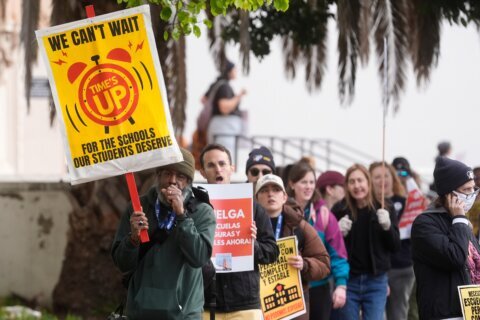While about half of American students are people of color, only about a quarter of teachers are. About 2% of teachers in the U.S. are Black men. A federal grant awarded to Bowie State University is aiming to boost that number in the years to come.
This week, the U.S. Department of Education gave out more than $18 million to a handful of colleges around the country. Bowie State is the only school in the D.C. region, and the only HBCU anywhere, to receive money through the Augustus Hawkins Centers of Excellence Program.
The school will get more than $1.5 million over the next four years through the grant, which is focused on improving preparation programs for teachers of color, while also increasing diversity among those leading classrooms.
At Bowie State, the grant means the ability to offer more scholarships and cover more expenses for Black men working to become teachers.
“[Since the pandemic], many of our students are working full time, so finances are important,” said Julius Davis, a professor in the school’s Department of Teaching and the founder of Bowie State’s Black Male Educator Project. “We don’t just have your traditional undergrad, 18-24. We have nontraditionals, folks who have families, folks who may have taken some time off, so we have a cross blend of Black male teacher candidates in our undergrad pool.”
Relieving some of that financial burden will help them be better students, Davis said. The grant will also have a big impact on the education program. For example, the hope is that Bowie State’s graduate level English as a Second Language program will expand into an undergraduate program, too, so those students could be certified.
But Davis has high hopes that more Black male teachers will mean more Black boys getting influenced in a positive way in the classroom. He said Bowie State has around 30 Black men working to become teachers at a time when education programs at other colleges struggle to attract any.
“One of the things that we know is that Black boys have not been served well in education,” Davis said. “Given Black male teachers have been Black boys, they sort of have an insider perspective on the experiences of Black boys and how to reach them in ways that are culturally grounded.”
But that means those future educators need to be developed into good teachers, “so they have a direct access to change the trajectory of Black male students’ educational experiences throughout the state of Maryland.”
He acknowledges that when teachers don’t connect with Black boys in the classroom, it doesn’t motivate those boys to become teachers themselves. That’s something else that has to change, Davis said.
“While this is their experience, they also have to be part of the solution,” he said. “Because they have an insider perspective on what it takes to change the trajectory of Black boys throughout the K-through-12 pipeline, throughout the state of Maryland and beyond.”








